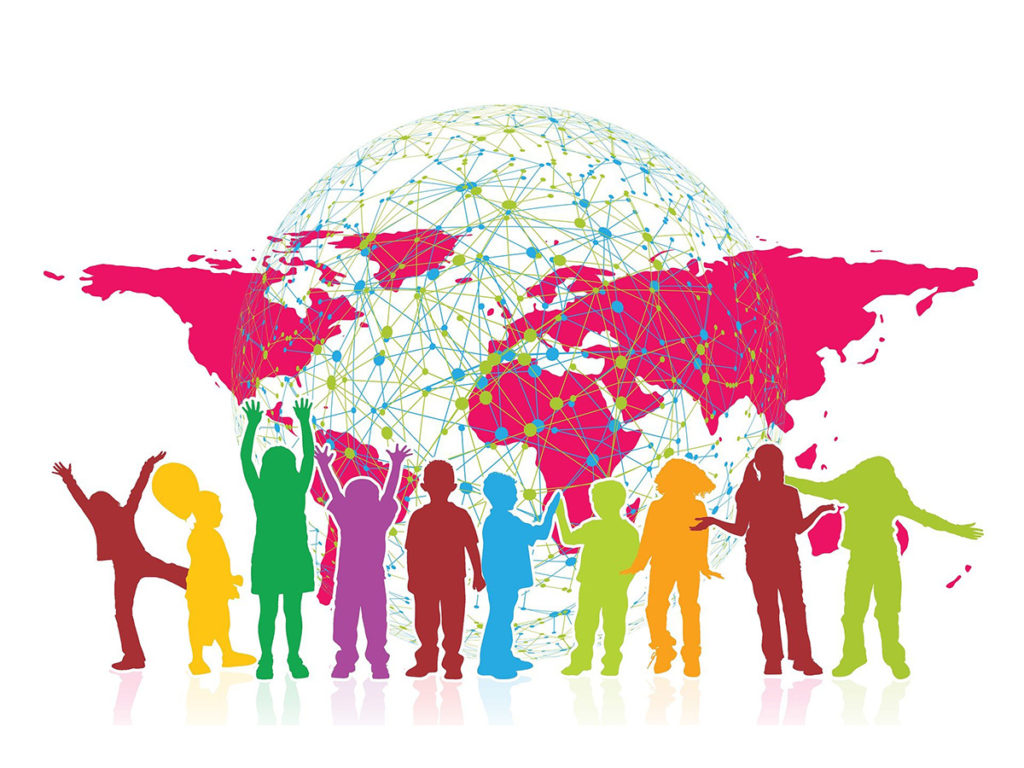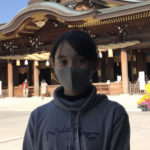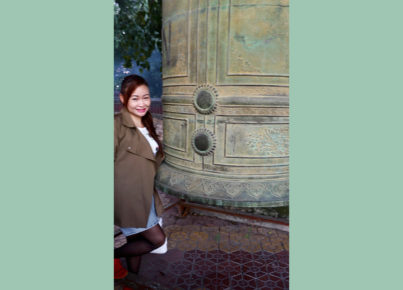“For an Inclusive World”
Yui Miyauchi
High School student
Japan
Good and Bad, Right and False, General and Unique, Rich and Poor, Developing and Developed; there are many pairs of words with opposite meanings that assess things, and people often use these terms. However, who is responsible for drawing a line between the two, or how were these criteria generated despite the world having geographical, cultural, and racial diversity? The COVID-19 pandemic was the first time when the world recognized the same thing, the spread of viruses, as the most urgent issue to tackle and took the same measure like a lockdown. This global response revealed inequality both within the nation and between nations. Usually, rich people get better medical treatment than the poor, and developing countries struggle with the lack of pharmaceuticals and medical technology than developed ones. The COVID-19 tells us that the world has to focus on eliminating inequality more than ever before so that every person accepts diversity, and every nation has enough power to guarantee the safety of its citizens’ lives. After the pandemic would be settled, I expect a world where all people worldwide are guaranteed to meet the standard of living.
Causes of inequality and solutions to fight it
This paper aims to provide how the world should improve after assessing the rooted causes of inequality. First, there are two types of inequality: between individual persons and between nation-states.
The inequality between individuals
The difference in social status and the asset connect to the inequality between individuals. For example, amid the pandemic, the quality of medical support depends on individual wealth. Economically weak people are struggling to receive any high-quality services in almost all capitalist countries. Though this kind of inequality seems to be attributed only to the economic cycle based on capitalism, there is a people’s way of thinking behind it. Jean-Jacques Rousseau mentions in his book, “Discourse on Inequality,” that people lost freedom since they started using objective evaluations to measure how happy or successful they are. The evaluations can be simply classified into two extreme sides. This is why there are plenty of word-pairs with the opposite meaning, like the ones illustrating initially. At the very beginning, it is considered that there was no superiority or inferiority between the two because humans had lived following their hearts, the same as animals. However, fixed ideas or biases always constrain us unknowingly because different environments and human relationships raised people up. After that the culture of looking at other people and measuring themselves by comparing with them erupted, the society was created. The original founders of the society also had their preferences, tendencies, and other personal traits. Because they created the “rules” and “laws,” people who have different perspectives find it hard to live in that society. From this perspective, overcoming biases and understanding different point of views are essential things to do for each of us. It is a simple thing for every person regardless of where they live and who they are. Although it appears to be boring since it does not require political or other big forces, the individual actions, when collected together, have the most influence. The fact that wearing masks prevents the viruses from rapidly invading the world clearly shows that collective individual efforts have the potential to change the significant flow and enhance society. If every member of the world individually embraced diversity, a community possessing impartial views would be born definitely. To break through circumstances where one part of people receive significant merits, it is required for everyone to polish a sense of diversity and proliferate it.
The inequality between nations
Next, the pandemic laid bare the apparent gap in power between countries. For example, after some developed countries constrained the export of medicine during the pandemic, countries that import medicines from them struggled with the epidemic of AIDs, the second disaster. This indicates that it is challenging for vulnerable countries to maintain countries’ security if the world simultaneously faces the same issue. This status quo is attributed to neoliberalism. Under neoliberalism, instead of developed countries aiding the developing countries, the developing ones belong to the international organization that the developed ones lead. Typically, it works efficiently on the surface because both nations can fulfill their national interests. However, the developing country loses sufficient power to sustain the country if the developed country prioritized protecting their citizens’ safety when such a worldwide disaster as this pandemic hits. The critical point here is that some developing countries cannot even support their own citizens’ lives. The world has to abolish the dependency chain and cooperate to raise the level of developing countries. At least, the world needs to continue working on it until all countries become able to protect their citizens by themselves. Concretely, the reform of international organizations can be efficient. In international organizations, every member has to be equal in their voting rights, regardless of their wealth and economy. If all countries having equal powers constituted the organization, they would be able to cooperate with each other in order for developing countries to reach the minimum level. After no one suffers from obtaining the standard of living anywhere, the world will be able to completely concentrate on other issues. Finally, it will help the industry and technology to develop at a global level.
Conclusion
In conclusion, the pandemic and the global response against it have revealed the potential inequality between individuals and between nations. It suggested the challenges to the next generation: how individual persons can overcome the dilemma between their own profits and idealism, and how nations can break through the dilemma between national interest and universalism. These are what we, as the next generation, have to resolve. However, the world is not desperate enough. The pandemic also taught us a good point: solidarity and connection disseminating the world are so strong that every country on every continent can contact and take appropriate measures simultaneously. Therefore, if each of us embraced diversity and every country gained the ability to independently guarantee citizens’ security, the world would be able to confront any tragedy as one team. The global response has the potential to solve other worldwide severe issues, for instance, global warming. As one of the world’s members in the next generation, I will start by acquiring various ways of thinking and spreading the necessity of understanding different views. “Man is born free, and everywhere he is in chains.” We, ourselves, are the only ones who can untie chains and make use of the experiences to strive for a better world. To unite the world, I call for each of you to openly accept how a person next to you is thinking, even if it is far different from what you think.
良いものと悪いもの、正しいものと間違っているもの、一般的なものと個性的なもの、豊かなものと貧しいもの、発展途上のものと先進のもの……物事を評価する言葉には、反対の意味を持つ言葉のペアがたくさんあり、人々はよくこれらの言葉を使います。しかし、この二つの線引きは誰の責任のもとに行われたのでしょうか?地理的にも文化的にも人種的にも多様性のある世界であるにもかかわらず、これらの基準はどのようにして作られたのでしょうか?COVID-19パンデミックは、世界が同じ問題を認識した最初の出来事でした。それはウィルスの蔓延に対して、ロックダウンのような措置を取ることで緊急に対処しなければならないと、どの国も共通の認識を持ったという事です。この世界的な対応によって、国内でも国家間でも不平等が露呈しました。通常、貧乏人よりも金持ちの方が優れた医療を受け、先進国よりも発展途上国の方が医薬品や医療技術の不足に悩まされています。COVID-19は、すべての人が多様性を受け入れ、すべての国が国民の生活の安全を保証するだけの力を持てるように、世界はこれまで以上に格差の解消に力を入れなければならないことを教えてくれます。パンデミックが収束した後は、世界中のすべての人々が生活水準を満たすことが保証される世界を期待しています。
不平等の原因とその解決策
本論文は、不平等の根源的な原因を評価した上で、世界がどのように改善していくべきかを提示することを目的としています。まず、不平等には、個人間の不平等と国民国家間の不平等があります。
個人間の不平等
社会的地位の差と資産の差が個人間の不平等につながります。例えば、パンデミックの中で、どのような医療支援が受けられるかは、個人の財産次第なのです。経済的弱者は、ほとんどすべての資本主義国で質の高いサービスを受けられずにいます。このような不平等は、資本主義を基盤とした経済循環のせいであるように思われますが、その背後には人々の考え方があるのです。ジャン=ジャック・ルソーは、その著書『人間不平等起源論』の中で、「幸福度や成功度を測るために客観的な評価を使うようになってから、人々は自由を失った」と述べています。評価は単純に両極端に分類することができます。そのため、最初にお示ししたような反対の意味を持つ語句がたくさんあるのです。その昔、人間は動物と同じように心に従って生きてきたので、両者の間に優劣はないと考えられていました。しかし、異なる環境や人間関係が人を成長させてきたので、私たちは、固定観念や偏見に知らず知らずのうちに抑圧されています。その後、異なる文化背景の人たちに目を向け、彼らと自分たちを比較して自己評価をするようになり、社会が生まれました。元々の社会の創設者たちにも、自分の好みや傾向などの個人的特徴がありました。彼らが「ルール」や「法律」を作ったからこそ、価値観の異なる人は、その社会で生きていくのが大変なのです。このような観点から、偏見を克服すること、異なる視点を理解することは、皆に必要なことなのです。それは、どこに住んでいるか、どんな人であるかに関係なく、すべての人にとって単純明快なことなのです。政治などの大きな力を必要としないのでつまらないことのように見えますが、個々の行動が集まったとき、最も影響力を発揮します。マスクを着用することでウイルスの急速な侵入を防ぐことができたという事実は、個々人の集団的な取り組みが大きな流れを変え、社会を高める可能性を秘めていることを明確に示しています。世界のすべての人が個々に多様性を受け入れれば、公平な視点を持った共同体が必ず誕生することでしょう。一部の人たちだけが大きなメリットを受ける状況を打破するためには、誰もが多様性の感覚を磨き、普及させていくことが求められます。
国家間の不平等
次に、パンデミックは、各国間の力の差を露呈しました。例えば、パンデミック時に一部の先進国が医薬品の輸出を制限した後、医薬品を輸入している国は、第二の災害であるエイズの流行に頭を抱えました。これは、世界が同時に同じ問題に直面した場合、脆弱な国が国の安全保障を維持するのが困難であることを示しています。このような現状は、新自由主義に起因しています。新自由主義の下では、先進国が途上国を援助するのではなく、途上国は先進国が主導する国際組織に所属します。一般的には、双方の国が国益を果たすことができるので、表面的には効率的に機能しています。しかし、今回のパンデミックのような世界的な災害が発生したときに、先進国が自国民の安全を守ることを優先してしまうと、途上国は国を維持するのに十分な力を失ってしまいます。ここで重要なのは、途上国の中には自国民の生活を支えることすらできない国があるということです。世界は依存の連鎖を断ち切り、協力して途上国のレベルを上げていかなければなりません。少なくとも、すべての国が自国民を自分の力で守れるようになるまで、世界は取り組みを続ける必要があります。具体的には、国際機関の改革が効率的でしょう。国際機関では、富や経済に関係なく、すべてのメンバーが平等に議決権を持っていなければなりません。全ての国が平等な力を持つ国が組織を構成すれば、途上国が最低限のレベルに到達するために、お互いに協力し合うことができるでしょう。どこの国でも基本的生活水準を得ることに苦しむ人がいなくなれば、世界は他の問題に完全に集中して取り組めるようになります。最終的に、産業と技術が世界レベルで発展していけるようになるのです。
結論
結論として、パンデミックとその世界的な対応は、個人間、国家間の潜在的な不平等を明らかにしました。不平等は、次世代へ挑戦状を突き付けたのです。それは、「個人の利益と理想主義のジレンマをどのように乗り越えていくか」「国家は国益と普遍主義のジレンマをどのように突破していくか」というものです。これらは、次の世代である私たちが解決しなければならないことです。しかし、世界は単に絶望しているだけではありません。今回のパンデミックは良い点も私たちに示してくれました。世界に広まる連帯とつながりは非常に強力で、全大陸のすべての国が連絡を取り合い、同時に適切な対策を講じられることが分かったのです。したがって、私たち一人一人が多様性を受け入れ、すべての国が市民の安全を独自に保証する能力を得れば、世界は一つのチームとしてどんな悲劇にも立ち向かうことができるようになるでしょう。世界が一丸となっての対応は、例えば地球温暖化など、他の地球的な深刻な問題を解決する可能性を秘めています。私も次の世代の世界の一員として、まずは様々な考え方を身につけ、異なる見解を理解する必要性を広めていくことから始めたいと思います。
「人は生まれながらにして自由であるが、至る所で鎖につながれている」 鎖をつなぎ合わせ、その経験を生かして、より良い世界を目指すことができるのは、私たち、自分自身だけなのです。世界を一つにするために、隣の人がどう考えているのか、たとえそれが自分の考えとはかけ離れたものであっても、それを素直に受け入れることを、私は一人一人に呼びかけます。








